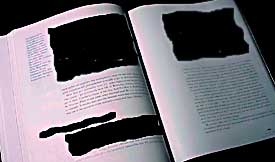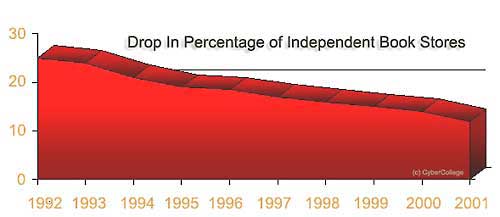The Print Media |
|
Books Part III
Censorship and Consolidation What do these books have in common?
In case you're wondering why, let's just consider the first three. Little Red Riding Hood has been censored because original versions included "wine" as a gift to grandma. The most popular (and most censored) children's books of this decade, the Harry Potter books, have been condemned for promoting witchcraft. Christian Parenting Today branded the books "pure evil." Even so, the series is credited in getting more young people interested in reading than any books in recent history. Alice's Adventures in Wonderland was originally banned because some people objected to the animal characters being able to use human language. Diary of A Young Girl, and The Color Purple, have won prestigious awards. Many censored books are even considered to be literary masterpieces. Even so, groups on both the political left and right have found their content inappropriate. Religious Right groups have had well publicized bonfires where they burn books, magazines and CDs. Interestingly, some groups censor Fahrenheit 451, a science fiction novel about a regime that burns books, and uses censorship to shape thinking and hold onto power. In 1929, all the Tarzan books were banned in Los Angeles, California, because it was reasoned that the fictional character Tarzan was living in the jungle with Jane without being married. One of the most notable and notorious censorship cases took place in 1959. This case centered on a book written by D. H. Lawrence in 1928-- Lady Chatterley's Lover. The objection was over the description of a sexual affair that Lady Chatterley had. Although this description would probably be considered tame by today's standards--which tells you just how much things change over time--in 1959, there was a major public outcry over the book. Over the years, publishers have spent millions of dollars fighting censorship cases. Money is one thing, but authors facing death for their work is another. Salman Rushdie, whose work appears in such places as the New York Times, wrote the book, The Satanic Verses. An Islamic religious group took exception to what he said, and reportedly put out a million-dollar contract on his life. Members of the religious group also threatened the publisher and others who had a part in publishing the book. Rushdie had to hide out for years, during which he had plenty of time to think about free speech (see below).
Textbook orders represent millions of dollars in sales for book publishers. Consequently, publishers are very sensitive to what consumers (primarily school boards) want and don't want. Some groups--again primarily conservative religious and political groups--have made major efforts to get control of school boards so that they can eliminate readings that are not consistent with their own views. After feedback from school boards, publishers sometimes "suggest" to their authors that sections of their manuscripts be added, deleted, or altered. This has been a particular issue with history, social studies, and biology textbooks. Theories of creation and sexual information have been major issues. Texas has been especially active in this regard. Conservative groups that have taken over many textbook selection committees often object to passages in texts. In 2002, one textbook was rejected because it revealed that during the time Texas was being settled, the state had 50,000 prostitutes. Other reasons for rejecting textbooks in Texas seems to center on even smaller issues. Of course, being one of the largest purchasers of textbooks, a decision like this can represent hundreds of thousands of dollars in revenue--enough to pressure some publishers to "rephrase" history to please buyers. The book, The Language Police: How Pressure Groups Restrict What Students Learn, by Diane Ravitch, documents many examples of seemingly innocuous words and phrases that are expunged from today's books. Here are some other examples of things that publishers, in an effort not to offend anyone, have deleted--or have been asked to delete--from textbooks.
What's left? Nothing with much "flavor," which explains why so many textbooks are, in the words of one critic "so dry and boring." The tendency to alter texts to please special interest groups has become much more of an issue as book publishing has shifted from independent publishers, who felt a responsibility toward the integrity of publishing, to large corporations whose primary goal is sales. (One of the advantages of a not-for-profit Internet text is that you don't have to worry about this kind of thing.) The writer came up against the power of pressure groups to influence content when a member of a women's group reviewed one of his textbook manuscripts and objected to an instance where a woman was portrayed in a negative light. At the same time the reviewer had no objection to negative portrayals of men in the same manuscript. To placate the reviewer the publisher suggested that the reference to the woman be dropped. But sometimes "objectionable" textbooks are adopted anyway. When a biology textbook containing a chapter on human reproduction was adopted in one school district, the principal stapled all the pages together so In another biology textbook drawings of the male and female genitalia were painted over with black poster paint. To their credit, some authors and textbook publishers conclude that their work represents an accurate and balanced perspective, and they resist efforts to alter their manuscripts and textbooks--even to the point of losing lucrative contracts. Censorship efforts also have extended to government groups--for example, the Chicago Police Bureau of Censorship that was active during the 1940s and 1950s--and even to local businesses. In the latter case a lumber company wanted Dr. Seuss's book, Lorax, banned because it told the story of some fuzzy little creatures that lost their home because all the trees had been cut down where they lived.When we survey the long history of book censorship, which includes everything from Shakespeare's plays to Walt Disney's Snow White, you have to conclude that there is hardly a viewpoint or story theme that someone, somewhere, won't object to. Although dictatorships around the world routinely censor materials that they feel detract from their causes, the United States has prided itself in having free speech. But, each year groups try to ban hundreds of books in the United States, and almost half of their efforts are successful. According to historian John Tebbel, the "virtual epidemic of censorship," we've seen in recent years is due to three factors: 1. the militant advocacy of fundamentalist values, often promoted by TV evangelists 2. the large number of traditionalists unable to accept change; people who long for earlier times and earlier moral values 3. the Supreme Court's 1973 decision (Miller v. California) that left the definition of obscenity to local community standards
Throughout history, the U.S. Supreme Court has generally upheld the interests of free speech. Exceptions have primarily related to obscenity (which has proven impossible to reliably define) and national security (a designation that sometimes keeps government documents that might prove politically embarrassing from the public ). These issues are discussed in the modules that cover legal and ethical issues. Even the Revised Version of the Bible was at one time considered to be a work of the Devil by some religious groups, and Communist inspired by some political groups. (The RSV version of the Bible is now considered to be one of the most accurate and authoritative versions of the Bible.) As we've noted elsewhere, change is inevitable, and the direction and nature of social change has been well established.
Before the 1960s, the book publishing industry was composed mostly of independent companies whose only business was books. But, growing profits made the business attractive to large corporations looking for new investments. At about the same time, that large corporations started buying up publishing houses, they also started buying out independent bookstores. A nine-year period is shown below. The combined effect of fewer independent book publishers and fewer independent bookstores resulted in some major changes in book publishing. While corporate profits have increased (which is good news for the shareholders) the type and scope of books have decreased. Instead of risking the publication of new titles by unknown authors, these corporations tend to stick with known authors and proven success formulas. This, of course, makes it difficult for new authors with new ideas to enter the marketplace. Today, only a very small percentage of the works of new authors are considered for publication. At the same time, the industry is rift with stories about manuscripts that have been turned down by 20 or 30 publishers, only to later become bestsellers. For example, Stupid White Men, was repeatedly turned town by HarperCollings in 2001. When librarians heard why (it's humorously critical of the Bush administration and the 2000 election) they circulated the fact in Internet chat rooms forcing the publisher to finally publish the book. Stupid White Men instantly became a nationwide bestseller. Faced with the long odds on having a manuscript accepted for publication, many new authors resort to self-publishing their books through vanity presses (publishing houses that charge for publishing a limited number of copies of their book). A few self-published books have become bestsellers, but only after they attracted the attention of a large publishing house that had the promotion and distribution clout necessary to market the book on a large scale. In the next section we'll look at the present status and future prospects for book publishing. |
|
To next module To index © 1996 - 2005, All Rights Reserved.
|



 that students couldn't read them.
that students couldn't read them. 